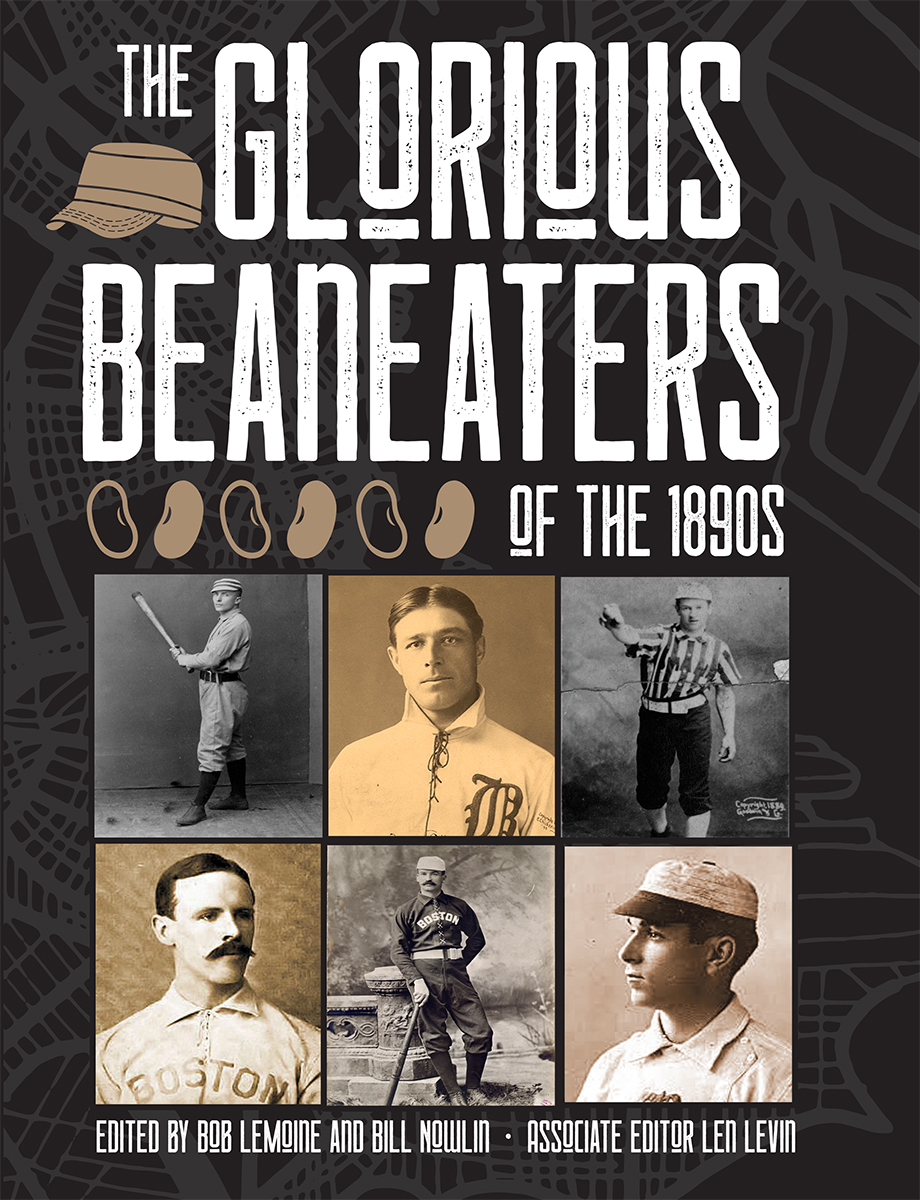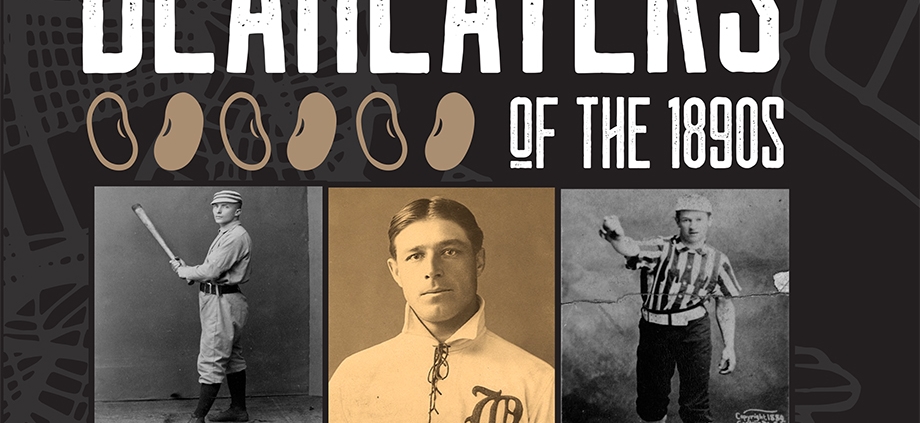1897: Last Gasp of the Temple Cup
This article was written by Bill Felber
This article was published in 1890s Boston Beaneaters essays
 The 1897 Temple Cup series opened on October 4 in Boston exactly one week after the conclusion of the two teams’ dramatic pennant-deciding series. The Beaneaters had won that series, which was played in Baltimore, two games to one, taking the third and deciding game in front of an estimated 30,000 spectators.
The 1897 Temple Cup series opened on October 4 in Boston exactly one week after the conclusion of the two teams’ dramatic pennant-deciding series. The Beaneaters had won that series, which was played in Baltimore, two games to one, taking the third and deciding game in front of an estimated 30,000 spectators.
But because the Cup series was by then widely viewed as more an exhibition than a true championship contest, enthusiasm waned quickly among fans of the competing entries. In part this reflected leaguewide questions regarding the importance of the Cup. In two of three previous iterations, the runner-up had defeated the League champion, the only exception being the 1896 Orioles, who beat runner-up Cleveland. Rumors of pot-splitting, effectively watering down teams’ motivation to win, also damaged credibility.
In both 1895 and 1896, responding to the growing sense of disinterest, Chicago owner James Hart had introduced a motion at the League’s winter meeting to terminate the competition and return the Cup to its donor, William Temple, a Pittsburgh businessman.
Boston fans who attended the series opener on October 4 at the South End Grounds had little motivation to look forward to the series. Their team, after all, had already won what was perceived to be the defining test, the regular-season championship. Still, an estimated 10,000 showed up that Monday afternoon, most apparently motivated by a desire to salute the new champions.
What those fans saw was a far cry from the championship enthusiasm the two teams had so recently displayed against each other. The clubs combined for six errors, eventually leading to several unearned runs In the next morning’s Globe, longtime writer and former player Tim Murnane described it as “a weak affair.”1 Boston ace Kid Nichols, a 31-game regular-season winner, pitched listlessly for six innings, allowing 14 Orioles hits. But Baltimore’s Jerry Nops was equally bad. In gathering darkness, the Beaneaters scored the tying and go-ahead runs in the bottom of the eighth and won 13-12.
The relatively dissolute play appeared to turn off fan bases already predisposed against investing emotionally in the series. One sure intimation that the contestants were not investing their hardest labors came when Beaneaters manager Frank Selee declared Nichols out for the remainder of the series. The next afternoon, only 6,000 took the trouble to watch Orioles ace Joe Corbett meet Boston’s Fred Klobedanz.
Like the first game, it was a loosely played affair. The two teams combined for 33 hits and numerous errors. The teams traded six-run innings in midgame, and Corbett proved his own best offensive friend, delivering four hits. Heinie Reitz’s fifth-inning home run knocked Klobedanz out and lightly-used veteran Jack Stivetts finished up.
If any enthusiasm for the series remained in Boston after that second-game defeat, it was fully drained early in Wednesday’s third game. Only about 5,000 bothered to attend, watching the Orioles take a quick 8-0 lead and win 8-3 in a game called after seven innings because of darkness.
Editors of the Globe effectively captured the increasing ennui surrounding the event even in the Boston baseball hotbed, eliminating front-page coverage and consigning its reporting to the middle of the fifth page in smaller headline type than it gave Harvard’s victory over Bowdoin. “Rather Tired,” the headline writer wrote of the performance, which included nine bases on balls to Baltimore batters. Said Murnane, “The long season’s grind has told on the boys and they seem anxious to quit.”2
In an effort to pick up some spare change, the two teams played exhibitions in Worcester and Springfield, Massachusetts, on their way down to Baltimore to resume the series on Saturday, October 9. The Orioles won both those games as well. When they arrived at Baltimore’s Union Grounds, however, they found enthusiasm far, far less intense than it had been for the concluding game of the regular season’s decisive series less than two weeks earlier. The Baltimore Sun barely took notice of the series’ resumption on game day and devoted just six inside paragraphs to a story played midway down the sports page the following Monday (with no edition on Sunday).
Another dozen unearned runs, created by a half-dozen errors, marred the fourth game, which was decided when Baltimore tapped Boston starter Stivetts for a half-dozen runs in the first inning and five more in the second. The Orioles eventually won 12-11 before what was merely described as a “small” crowd.
That put Baltimore in position to clinch retention of the Cup by taking the series’ fifth game on Monday, October 11. As if anybody cared; only an estimated 700 Baltimoreans showed up to take in the potential decisive game. Baltimore broke a 2-2 tie with three runs in the third inning and breezed home behind Wizard Hoffer, 9-3. As in previous games, Boston’s absence of true investment in the outcome could be seen on the mound, where manager Frank Selee entrusted pitching duties for the “do or die” game to Charlie Hickman and Jim Sullivan. Hickman was a 21-year-old rookie with a total of 7⅔ innings of mound work under his belt; Sullivan had gone 4-5 in 13 appearances during the regular season.
Among those less than enchanted with the play was the cup’s donor, William Temple. Informed of the result, he asked the League to investigate “the charges that the Baltimore and Boston players this year agreed to an equal division of the receipts in face of the League’s explicit conditions about 60 percent to the winner and 40 percent to the loser.” If chicanery was uncovered, he added, “I shall ask that the offenders be blacklisted.”3
The Sun’s reporter all but conceded the truth of Temple’s allegation. “It is pretty certain … that most, if not all, the players on both sides privately made such an arrangement among themselves,” the reporter asserted.4
League officials ignored Temple’s demand for an inquiry. But one month later at that winter’s annual meeting, faced with the obvious and growing lack of interest in the event, they voted 10 to 2 to terminate the Cup series and return the trophy to Temple.
BILL FELBER is a retired newspaper editor. He is the author of numerous books on baseball, golf and the cavalry, among them A Game of Brawl: The Orioles, the Beaneaters and the Battle for the 1897 Pennant. He is a regular contributor to calltothepen.com.
Notes
1 T.H. Murnane, “One of Them,” Boston Globe, October 5, 1897: 8.
2 T.H. Murnane, “Rather Tired,” Boston Globe, October 7, 1897: 5.
3 “Mr. Temple’s ‘Kick,’” Baltimore Sun, October 13, 1897: 6.
4 Ibid.


